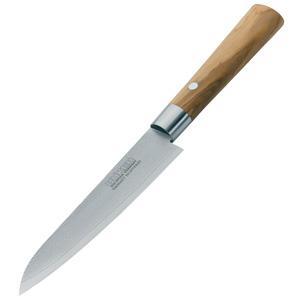 For every good piece of information that exists online about knives, there are more than a few inaccuracies. So, how do you wade through the drek to find the information that’s important and accurate? You should start by not passing on these 4 popular knife myths.
For every good piece of information that exists online about knives, there are more than a few inaccuracies. So, how do you wade through the drek to find the information that’s important and accurate? You should start by not passing on these 4 popular knife myths.
#1 Stainless steel knives can be washed in the dishwasher
They can’t, or at least they definitely shouldn’t be. The force of water can decrease the sharpness of knife edges by pushing them against shelves or other utensils. In addition, the combination of hot water and the chemicals that exist in detergent can leave stains on stainless steel cutlery if it comes in contact with silver.
Secondly, washing sharp knives in the dishwasher could be dangerous to your physical safety if you or a family member reach into the dishwasher without paying proper attention.
#2 A dull knife is safer to use than a sharp one
This is another myth that needs to be busted. Though a dull knife will have less of an impact if it grazes your flesh, it’s not safer. Because of its dullness, you’ll often have to cut more vigorously, exerting a lot of force and pressure. This decreases your ability to control the knife and elevates the potential for accidents.
The best plan for cutting in the kitchen is to use a well-sharpened knife that you don’t need a lot of effort to operate, giving you maximum control.
#3 There are knives that stay sharp forever
There aren’t. Certain serrated knives are advertised as staying sharp forever, but the serrated “teeth” of these knives will eventually wear down or fail. Don’t fall for the inaccurate advertising here. Regardless of the knife you buy, it will require sharpening.
#4 It is best to send your knife to a professional to be sharpened
Though professional sharpening services can do a good job, they often use conventional grinding stones that can remove too much metal. High quality knife sharpeners are available online at affordable prices, and they’re easy to use. There’s really no reason to spend time and effort on a professional knife sharpening service, when you can easily sharpen your knives at home.




June 24, 2017 at 7:41 pm
#2 gets the myth backwards. It’s frequently repeated that sharper knives are safer. But actual evidence indicates that has never really been true. When you talk to people who work with knives, it’s always the really sharp knives that have caused them injuries. Why? Because proper technique will prevent both dull and sharp knives from injuring you if they slip. But very sharp knives frequently cause injuries from any slight contact with the blade when handling the knife, especially when not in the act of cutting.
The idea that sharper knives are safer often repeated, but it’s a myth.
August 16, 2017 at 8:54 am
That’s completely untrue. Dull knives require more force and can slip or slide from their cut. All studies – and I’m in the insurance business – show that the sharper knife is not only safer, but is used with less force resulting in a much shallower and cleaner cut if an accident happens.
September 16, 2020 at 8:25 pm
100% true
December 1, 2020 at 4:29 pm
True and not at the same time. A sharp knife will cut very deep quickly, but it will be a clean cut hich will heal somewhat faster versus a dull blade which will tear and make a worse wound, harder to heal
December 26, 2017 at 12:03 pm
Proper knife technique is NOT a myth and something every cook, regardless of level, should study and practice. Keep your steel sharp and you don’t have to worry about myth.
My mother held her paring knife in one hand and the object of her paring in the other. Even after i became a chef I couldn’t convince her to work on the board.
We really cling to our elders’ lessons-
March 13, 2018 at 5:15 pm
#2 is backwards, The common wisdom is that sharp knives are safer, but this isn’t true. Ask anyone how many times they’ve been cut by one vs the other.
September 16, 2020 at 8:26 pm
false, I have watched a chef cut himself with a just sharpened knife and by him mind you whilst professing the dull knife is much more dangerous than a sharp knife nonsense, the look on his face afterwards completely disproved that myth
February 17, 2022 at 12:15 pm
Bottom line know your utensils, sharp or dull. Always pay attention and be careful when using a knife. I learned this as a Girl Scout when I chopped my thump in half by talking and not paying attention to chopping wood. Luckily I just needed stiches and did not lose my thump. Here is another think I learned in Girl Scouts Never, Never, ever feed an animal that can eat you. Stay Safe out there my friends.